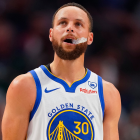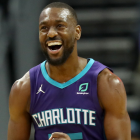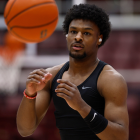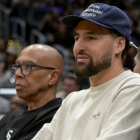TORONTO -- At the end of the first quarter of the Toronto Raptors' first-ever NBA Finals game, the franchise looked back. Nine men, all of whom played a role in shaping the team's first 15 years, stood side-by-side at halfcourt, each receiving a roaring ovation: Isiah Thomas, Muggsy Bogues, Charles Oakley, Jerome Williams (wearing his own autographed jersey), Dell Curry, Tracy McGrady, Morris Peterson, Chris Bosh and, finally, Damon Stoudamire.
Stoudamire was the franchise's first star. Thomas, its first general manager, kissed him on the head at his Rookie of the Year press conference 23 years ago. Eleven months before that, Toronto hosted the 1995 NBA Draft, and fans booed the point guard as he walked to the stage to shake then-commissioner David Stern's hand. They preferred Ed O'Bannon, who was fresh off a national championship with UCLA. Stoudamire knows that clip will be played as long as the Raptors' story is told.
At Scotiabank Arena, Stoudamire clapped, saluted the fans and took in the scene. He was not wearing a jersey with a red dinosaur on it, but Toronto's original public address announcer, Herbie Kuhn, said his name the exact same way he did in its inaugural season: "DA-MOOOOOON STOOOOOUDAMIRE." The Raptors' mascot -- also the same man who had the role in 1995 -- walked past him, hyping up the crowd.
"Memories come back," Stoudamire told CBS Sports. "You think about some of the moments that you had there. And then you just kind of embrace everything. The biggest thing for me, honestly, when I came back, was more so looking at where everything has come."
It has come to this: The Toronto Raptors are the 2019 NBA champions. They beat the two-time-defending champion Golden State Warriors in six games, closing things out Thursday at Oracle Arena in Oakland with a 114-110 final score. That's the culmination of 24 years, a span that saw the Raptors left as Canada's only NBA team. That saw Vince Carter, Bosh and DeMar DeRozan come and, for various reasons, go. That saw them move from the ill-fitting SkyDome to Scotiabank Arena.
The team played in a stadium meant for baseball and practiced at a college gym. "It was like the guinea pig stage," said Stoudamire, nicknamed "Mighty Mouse" as a 5-10 point guard. "We didn't have it like that, you know what I mean?" At the SkyDome, players got used to getting hit with a chilly breeze on the court. They learned this was because of a bus-sized door opening on court level. Many Torontonians were introduced to the NBA by a 21-win squad full of castoffs made available in an expansion draft.
"I think about that a lot, trust me," Stoudamire said. "Man, it used to be so cold in that SkyDome, practicing. We go to Humber College, we didn't even have a locker room."
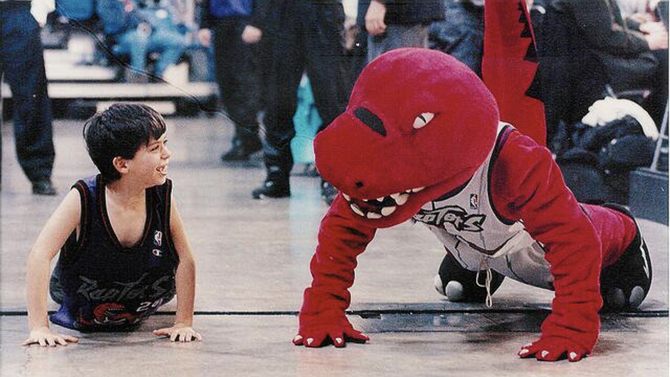
At 9 years old, I was one of more than 33,000 people at the SkyDome when Toronto beat the New Jersey Nets in their first regular-season game, and one of more than 36,000 when the Raptors gave Michael Jordan's Chicago Bulls one of their 10 losses that season. I was the only kid at school, however, with a Stoudamire jersey, and I wore it all the time. Before games, I'd run down to the corner of the court and high-five players before they warmed up. When my parents took me to a meet and greet with Stoudamire at a North York mall, he recognized me. He still remembers those team appearances.
"Those were really important when we first started based on the fact that everybody was trying to be ambassadors not only to Toronto, but to the rest of the country," he said.
It was not that nobody cared about basketball. It just wasn't woven into the fabric of Canada, passed down from generation to generation. I remember kids and adults telling me that the team wouldn't survive, that I must to learn to skate. For years, I tried to get friends into the sport, with varying degrees of success, and quickly befriended those who shared my enthusiasm.
"The fans were great," Stoudamire said. "I think they showed a lot of love and a lot of passion early on. I just think that, through and through, over the course of time, they obviously became more educated on the game and the sport."
Eventually, my parents' house was not the only one on our suburban street with a hoop in the driveway. The Raptors aggressively marketed themselves toward young people, and Carter changed everything. In the summer of 2001, coming off their first playoff series victory, they inked Carter, the league's most electrifying player, to a six-year contract extension. They also re-signed Antonio Davis, Alvin Williams and Jerome Williams, and they signed 38-year-old future Hall of Famer Hakeem Olajuwon -- deals that would haunt them but seemed sound at the time. At Carter's sold-out charity game, "Let's Go Raptors" chants filled the Air Canada Centre before tipoff and after the buzzer, picking up where the postseason left off. Toronto's rise felt inevitable.
The ugly end of Carter's tenure left scars, as did the selections of Rafael Araujo with the eighth pick in 2004 and Andrea Bargnani with the first pick in 2006. Bosh turned into a franchise player, then left, following the footsteps of Stoudamire, McGrady and Carter. He cited an inability to recruit his peers to join him in Toronto.
Fifteen years separated that first playoff series victory from the Raptors' second. For most of that time, it was not exactly cool to support them, and it was natural for fans to adopt an air of cynicism bordering on fatalism. Disheartening defeats in the Kyle Lowry-DeRozan era did not help. It is in this context that June, 13, 2019, the date Toronto earned its first NBA championship, must be understood. For those who have followed the franchise from the beginning, this year's team -- and the mania it has inspired -- is at once a culmination of years of growth and something out of an alternate universe.
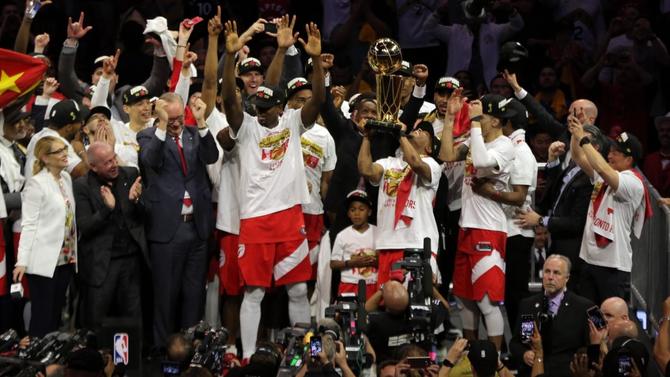
Kawhi Leonard made the free throws that sealed it on Thursday and screamed after the buzzer. Minutes later, he was named Finals MVP for the second time. He is the best player to wear a Raptors uniform, and he had a stunning, sublime postseason, averaging 30.5 points, 9.1 rebounds and 3.9 assists. This is the stuff of legends, the best-case scenario Masai Ujiri's front office envisioned when it acquired Leonard last summer. Days after the trade, Ujiri told reporters that he had to jump on his chance to get a player of Leonard's caliber. Ujiri believed he could sell the upcoming free agent on the city and the culture of the organization. It was true to the mission statement he'd established when he took the job.
"It's going to take patience, it's going to take will," Ujiri said at his introductory press conference in June 2013. "I want to instill a passion to win. Guys, the overall goal in the NBA is to win a championship, that has to be the overall goal. It's not playoffs, it's to win a championship at the end."
Ujiri is more fiery than your average executive, and the infamous "F--- Brooklyn" has precedents. A month into the job, he declared that he was "tired of all this, people come here and everybody calls the team soft or calls the team pushovers or all these stupid names they mention." Before the start of that regular season, he called Toronto a "sleeping giant." At a season-ticket-holder event, he said the Raptors had to "make this place a living hell" for opponents.
He often spoke as if he owed Toronto a roster worthy of the city. He had been here before, working for Bryan Colangelo for three years before Denver hired him away. There was a sense that the franchise needed to puff its chest out, even if he had no idea how long it would take to build a championship contender.
"I said it when I came here: I know this city will win," Ujiri said before the Finals started. "It's not me or anybody. There's something about it here and sports. It comes around."
Somewhere along the way, Raptors fans got more comfortable thinking big, too. Toronto fell behind 2-1 against the Philadelphia 76ers in the second round; 10 days later, Leonard hit his four-bounce buzzer-beater, a shot that immediately entered the pantheon. The Raptors lost the first two games against the Milwaukee Bucks, then won four straight, starting with a double-overtime thriller in which Leonard logged 52 minutes. They lost home-court advantage in Game 2 of the Finals, and Nurse told the team it had to go to Oakland and win one. "F--- that," Leonard responded. "Let's go get them both."
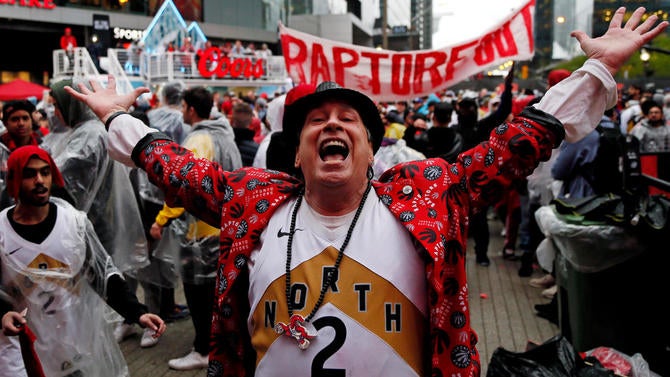
People started lining up for Jurassic Park almost immediately after Toronto won Game 4. Since then, though, every fan I talked to expressed some degree of anxiety. One told me he woke up at 3 a.m on Monday, hyped for a game that wouldn't start until 1:10 p.m. his time. He lives in Wellington, New Zealand now; he became a Raptors fan in 2001 when I took him to a triple-overtime game against the Sacramento Kings. He took a half-day at work, and could barely concentrate while he was there. Confidence might have felt more comfortable than it used to, but overconfidence did not. Fortunately for him, the team had precisely the right amount of belief, even after the Golden State Warriors snatched Game 5 away.
Throughout this playoff run, attributing Toronto's resilience to Leonard has made for a tidy narrative. Indeed, he is unflappable, a silent killer, but there has also been a team-wide sense of perspective and focus. Lowry, Marc Gasol and Danny Green have years of postseason experience. Every rotation player has taken criticism after poor postseason performances, then bounced back and swung games. The Raptors have adjusted better than anyone else, a product of playing multiple styles on both ends all season.
Before it all started, coach Nick Nurse made "AMJ" -- for April, May, June -- their north star. On wristbands and signage in the locker room and practice facility, those three letters reminded players what mattered.
"That was Nurse's thing," guard Fred VanVleet told CBS Sports. "He introduced it to us in the summertime and preseason, before training camp. Just to put all our focus on April, May and June and not get too high or low throughout the year. And that's just kind of the way we approached it."
Nurse never got rattled by regular-season losses. That made it more powerful when he lost his temper after the playoff opener against the Orlando Magic, telling his team that it needed to play with more intensity. He believed in the Raptors' talent, versatility and intelligence. In his view, competition demands fearlessness.
"[Nurse] exudes a lot of confidence in our team," assistant coach Adrian Griffin told CBS Sports. "And I think our team has taken over his personality, that we're expected to win, we're expected to play well, we're expected to play harder than our opponent and we're never out of a game."
For some, there has been dissonance in watching a Toronto team repeatedly rise to the occasion. I no longer root for the Raptors or live in Toronto, but I can trace my path from obsessive fan to professional writer through this franchise's history, full of dysfunction and disappointment and a rotating door of players from Acie Earl to Quincy Acy. It has been special to see a niche interest become ubiquitous, inspiring euphoria at watch parties all over the country.
Days before Toronto took its place in NBA history, Stoudamire said that a championship would put a stamp on a city he already considered top-notch. In an arena that reminded him more of the World Cup than the NBA Finals, he chatted with fans, including one who was sporting an Acie Earl jersey. They told him how excited they were to watch their team on this stage. But they didn't need to say anything.
"You can feel it," Stoudamire said. "You can feel the energy."
Twenty-four years from the guinea-pig stage, the world can feel it.










